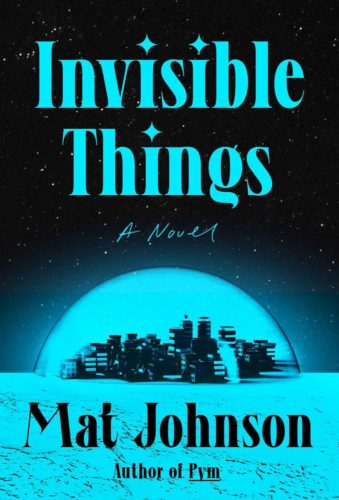
“I love science fiction, but I don’t write it,” says Mat Johnson, University of Oregon Philip H. Knight chair of the humanities and author of Invisible Things. “I write speculative fiction.”
Johnson explains that science fiction focuses on the specifics of the science itself but speculative fiction is more concerned with how it affects the individual people involved. Invisible Things dives into politics and how individual astronauts are affected by a massive, life changing discovery. It isn’t preoccupied with scientific explanations.
In Invisible Things, which was published June 2022, Nalini, a sociologist aboard the spacecraft SS Delaney spots something unusual: a city encased in a bubble on Europa, one of Jupiter’s moons. The city, New Roanoke, appears to be a re-creation of a typical American city. The book delves into humor, the wit of the characters proving dynamic and engaging. The premise intrigues and the mystery of it all urges the reader forward. Why and how does this city exist? The Founders, the political party that controls New Roanoke, prove to be nativist, malevolent and content to maintain the veneer of democracy while simultaneously crushing any opposition.
What happens to the astronauts who land in the city, like Nalini? The Founders tell them that they, like the rest of the residents of New Roanoke, were chosen by God to be a part of this society. Some of the astronauts, resigned to the fact that they will never escape the dome, embrace the Founders Party. Others keep their heads down and find a job in this new city, trying to forget the world they left behind. Fewer still speak out and organize against the Founders.
Johnson has been enamored with the idea of re-created cities for some time. “I was fascinated by spy cities in Ukraine and Eastern Europe during the Soviet Union,” he says. “They would create these fake American cities, and then spies that were headed to the states would get the chance to learn how to act in an American city.” They learned how to mail letters, shop for groceries and other things Americans do on a daily basis.
Through depicting a future lunar society and a fictionalized culture with its own politics, Johnson also explores the ways people deal with topics such as the climate crisis.“But these issues are so big that they’re almost impossible to deal with, so we shut down because no one seems to have any answers anyway,” Johnson says. Climate change, he argues, is a prime example of a topic that people already have plenty of preconceived notions about. And because of that, he reasons, it’s impossible to go into a conversation about climate change unguarded, without biases and defenses getting in the way. People remain convinced of their stance on the matter.
Johnson started writing Invisible Things five years ago, before COVID, but these ideas solidified with the advent of the pandemic when anti-vaxxers and COVID deniers spoke out. “I saw, in real time, people ignoring things because they’d rather stick with their preconceived notions about the world,” Johnson says.
This is where speculative fiction comes in. “Metaphor allows you to deal with issues that people would otherwise shut down immediately,” Johnson says. “It also frees me, as a writer, to cut away all the specifics around certain issues and just look at the basic idea.” For example, in New Roanoke, residents whose families have lived on this moon for generations —- those with the power, wealth and political influence — discriminate against those who have just arrived. This nativist attitude exhibited on New Roanoke satirizes our current, often unquestioned attitudes towards marginalized groups.
“Backing up and just looking at the way we approach these issues seems to me a better way to deal with the larger problems, not just the symptoms,” he says.
Johnson takes inspiration from fellow speculative fiction writers George Orwell and Margaret Atwood, who “use the surreal to try and get closer to the truth.” Speculative fiction, at its most effective, is “a disruptive force that makes you want to rethink everything,” he says.
Invisible Things is available for purchase at local bookstores. Find out more about Mat Johnson at MatJohnson.info.